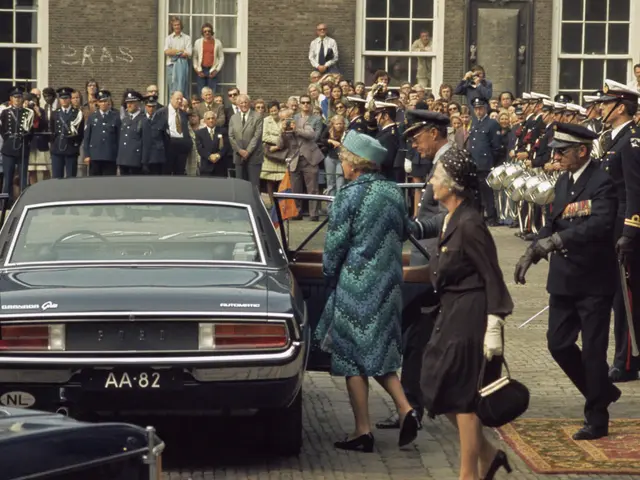U.S. confronts pressure from Mexico over unchecked southbound gun traffic despite loss at Supreme Court
American-Made Arms: The Epidemic in Mexico's Bloodshed
In the heart of Mexico City, a billboard once stood, urging US officials to halt the Iron River - the southbound flow of weapons fueling Mexico's gruesome violence. The message, "No More Weapons," was crafted from 3 tons of seized guns, yet the bloodshed persisted.
More than a decade later, Mexico, in desperation, filed a $10-billion lawsuit against gun manufacturers in the US, including Smith & Wesson. The case, despite an appeals court challenge, made it to the Supreme Court, only to be dismissed unanimously, with federal law shielding gunmakers from liability.
Advocates argue the lawsuit served an important purpose, refocusing attention on the role of US-made weapons in Mexico's daily onslaught of assassinations, massacres, and disappearances.
"This high-profile move has achieved significant success," said Jonathan Lowy, president of Global Action on Gun Violence. "It has placed gun trafficking and the industry's complicity in the gun pipeline squarely on the bilateral and international agenda."
The Supreme Court's decision did not spell the end of Mexico's legal fight against US gun dealers. A separate lawsuit accusing five Arizona dealers of trafficking weapons and ammunition to cartels is still pending in a US federal court.
Mexico's President Claudia Sheinbaum praised the US's recent acknowledgement of responsibility in clamping down on southbound gun trafficking, a shift that took years to materialize. She highlighted the need to stop the unchecked flow of weapons as crucial inreducing cartel violence.
Unveiling the Horrors of "Mexican Auschwitz"
Reported horrors at a cartel training site have Mexican authorities denying claims of mass executions and crematoria. The site, infamously dubbed "Mexican Auschwitz," has raised concerns about human rights abuses perpetrated by cartels.
Oaxaca's Tragedy: Activist's Brutal Disappearance and Execution
The disappearance and brutal killing of an indigenous activist and her husband this past fall in Mexico's Oaxaca state has sparked widespread outrage. The bodies of the couple were recently found in shallow graves, raising questions over the region's safety and rule of law.
Meanwhile, the US has recently designated six Mexican cartels as foreign terrorist organizations, which could lead to terrorism-related charges for weapons traffickers.
U.S. Secretary of State Marco Rubio stated, "We want to help stop that flow." In a show of force, federal agents gathered a collection of seized weapons in Laredo, Texas, to underscore a newfound resolve in stopping illegal arms commerce.
"Craig Larrabee, special agent in charge of Homeland Security Investigations in San Antonio, stated, "This isn't a weapon just going to Mexico. It's going to arm the cartels. It's going to fight police officers and create terror throughout Mexico."
A Showdown Over Trump's proposed Attack on Cartels
President Trump has expressed his desire to attack Mexican drug cartels. A unilateral U.S. action would pose a significant challenge for Mexican President Claudia Sheinbaum, who maintains that her country will "never accept" U.S. intervention on Mexican soil.
In their legal battle against U.S. gun manufacturers, Mexican authorities argued that it was implausible for companies to be unaware that their products were destined for criminal hands. The gun industry, however, has disputed this claim.
While Mexico maintains a strict firearm policy, the availability of US-origin, black-market weapons undermines its stringent gun laws. Mexican officials estimate that 200,000 to 500,000 guns are smuggled into Mexico annually. Data from the US Bureau of Alcohol, Tobacco, Firearms and Explosives shows that most firearms in Mexico come from the US, particularly in Texas and other Southwest border states.
As the war on drug cartels rages on, the search for a lasting solution continues. Mexican leaders have long warned against the dangerous consequences of unchecked gun trafficking, appealing for tighter regulations and cooperation from the US to disrupt the flow of weapons to cartels.
- The ongoing issue of gun trafficking from the United States to Mexico was underscored when a collection of seized weapons was displayed in Laredo, Texas, a move intended to show a newfound resolve in stopping illegal arms commerce.
- Fuelled by the availability of US-origin, black-market weapons, Mexico's stringent firearm policies are often undermined, with an estimated 200,000 to 500,000 guns being smuggled into the country annually.
- In a bid to address this issue, Mexican authorities have argued that it is implausible for gun manufacturers to claim ignorance about their products ending up in criminal hands, a claim disputed by the gun industry.
- Meanwhile, the legal fight against US gun dealers continues, with a separate lawsuit accusing five Arizona dealers of trafficking weapons and ammunition to cartels still pending in a US federal court.








